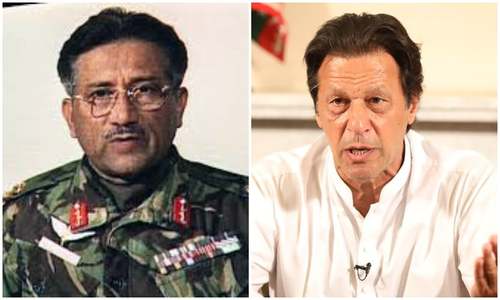An special court in Islamabad on Thursday admitted former military dictator retired Gen Pervez Musharraf's plea for adjournment of the hearing of a high treason case against him till the end of the holy month of Ramazan.
Gen Musharraf is facing a treason trial under Article 6 of the Constitution as well as Section 2 of the High Treason Act on a complaint moved by the federal government. In line with the earlier directive of the Supreme Court, the trial court was scheduled to record Gen Musharraf’s statement under Section 342 of the Criminal Procedure Code to complete the treason trial but the former dictator could not appear before the court due to medical reasons.
A three-member bench, headed by Justice Tahira Safdar, granted Musharraf's appeal after his lawyer Salman Safdar told the court that doctors had advised him to avoid travelling due to his health issues. Safdar maintained that although Musharraf wished to return to the country, his health did not allow it, and appealed to the court to grant the plea on humanitarian grounds.
Read more: Musharraf explains why he put off his return*
The counsel also submitted medical reports and snaps of Musharraf's treatment in a hospital abroad. He said that the 76-year-old is suffering from several diseases, including a life-threatening disease.
The application stated that, in view of Gen Musharraf’s serious condition, the former president was sincerely apologetic for not appearing before the court.
He added that the case had been lodged against Musharraf in 2007. Despite the cases against him, Musharraf came back to his homeland in 2013, the lawyer said, adding that his client had been indicted in the case in March 2014. He said that Musharraf had been in the country for 2 years and three months but the prosecution could not prove its case.
The counsel said that Musharraf was unable to move as he had been admitted to a hospital 40 times during the last two years.
"Musharraf should be given an opportunity to appear so as to fulfil the requisites of justice," the counsel said, adding that currently the former dictator was unable to speak and that he could not respond to the questions in court without his client's assistance.
The prosecution raised objections over the plea but was overruled.
The special court issued a notice to the government over a plea for acquittal of Musharraf in the case. The hearing of the case has been adjourned till June 12.
On April 1, the apex court had directed the special court to proceed with the trial on the next date of hearing (May 2) and in case the former president surrendered and appeared before it, he would be entitled to record his statement.
But if he failed to appear, being a PO (proclaimed offender), the special court is empowered to proceed against him even in his absence under Section 9 of the High Treason (Punishment) Act, 1973, the top court had held.
According to the latest assessment of April 29, undertaken by Dr Faraz Khan at the American Hospital, Dubai, Gen Musharraf’s health was been termed unsafe in case he discontinued treatment and travelled, the application argued.
Moreover, the permission to undertake exertion and travel had plainly been refused by the medical practitioner, the application said, adding that the former president was suffering from cardiac amyloidosis (congestive heart failure), chronic kidney disease (high creatinine in renal system), excessive somnolence (hypersomnia), spinal injury and fracture.
The application pleaded that the former president was extremely apologetic for the inconvenience caused to the special court due to his absence.














































